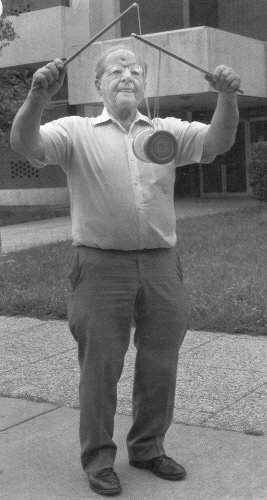
Phineas Indritz (Shelly Harris photo) |
Page 7 Winter '97 - Spring '98
|
In Memoriam
The Attorney Juggler Passes
Phineas Indritz, an honorary IJA Life Member, died at age 81 on Oct. 15, 1997, after a long illness. A former gymnast, he learned to juggle in 1944 and attend- ed most IJA festivals since 1948. He was also a longtime member of the U.S. Department of Juggling in Washington, D.C., where he taught many members about the diabolo, club swinging and handstands. Loud Hawaiian shirts, peppermint candies, a whistling diabolo, a scholarly mind, and an encyclopedic memory for obscure facts and details of constitutional law were his trademarks.
Indritz was a distinguished legal counsel to committees of the U.S. Congress, and was a civil rights lawyer and activist who participated in dozens of cases aimed at ending discrimination based on race and gender.
He was born in Moline, Ill., and graduated from the University of Chicago and its law school. He was a competitive collegiate gymnast, and qualified for the 1936 U.S. Olympic gymnastics team but did not go to the Olympics. He moved to Washington in 1938 to join the legal staff of the Interior Department, and served in the Army Air Forces during World War II. He began juggling in 1944 after injuries forced him to forego gymnastics. He told an interviewer he deliberately settled on juggling because he wanted an activity he could "do by myself or with others, indoors or outdoors, at a high level or an easy level, and to a very late age."
He continued, "During the war I was stationed in various places, and I would go to a circus or a show and ask jugglers in between performances to show me things. I met people like Trixie, Francis Brunn and Massimiliano Truzzi that way, and they were all very nice to me." He attended his first IJA festival in 1948, and attended most that have been held since then. He also served the IJA as a volunteer legal counsel, and was named an Honorary Life Member of the IJA in 1991 at the St. Louis festival for his longstanding loyalty to the organization.
He was a founding member and executive vice chairman of the American Veterans Committee, a multiracial equal rights organization of U.S. servicemen and women formed during the war. As national counsel to this committee, he supported civil rights legal actions on various fronts. He was also involved in many national crucial civil rights cases, including Brown v. Board of Education, which desegregated public schools in the 1950s. In 1950, he received an award from the D.C. chapter of the NAACP for his legal efforts "involving basic civil rights of minorities."
He was also a founding member of the National Organization for Women. Indritz left the Interior Department in 1957 to begin working on Capitol Hill as a legal counsel to several congressional committees. From his desks in various House office buildings, Indritz took periodic juggling breaks on the Capitol lawns, where his feats delighted friends and tourists. He officially retired from the staff of the House of Representatives during the 1970s. But as a practical matter, not until 1994 did he leave Capitol Hill, where there remained a special desk and telephone reserved for him in House office buildings.
His place in juggling history was assured by teaching Allan Jacobs the basics of club swinging in 1978. Jacobs introduced the juggling world to club swinging in his winning routine in the 1983 IJA Individual Championships. He subsequently taught the art to hundreds of jugglers in workshops, making it part of the standard repertoire of contemporary juggling skills. Jacobs also made an instructional video on club swinging, and dedicated it to Indritz.
His wife of 34 years, Ruth Gould Indritz, died in 1974. Survivors include three children, Tahma Metz of Bethesda, Tova Indritz of Albuquerque and Dr. Doren Indritz of Phoenix. |

Phineas Indritz (Shelly Harris photo) |